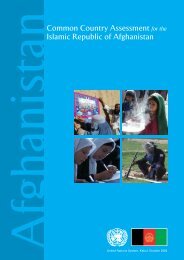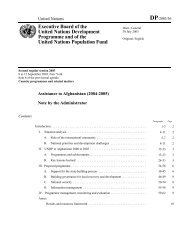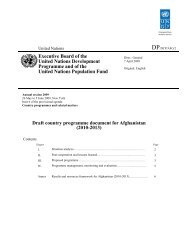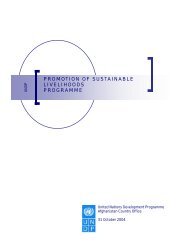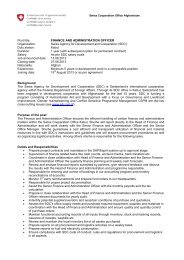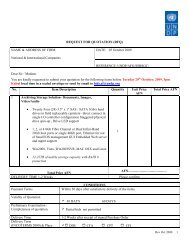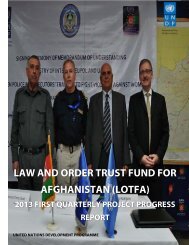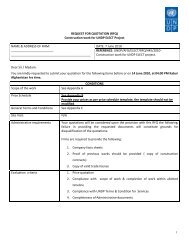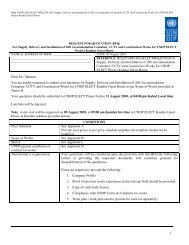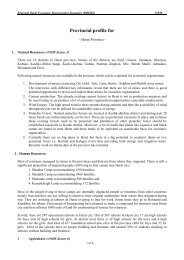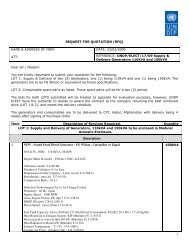Final Report of SEAL I - UNDP Afghanistan
Final Report of SEAL I - UNDP Afghanistan
Final Report of SEAL I - UNDP Afghanistan
Create successful ePaper yourself
Turn your PDF publications into a flip-book with our unique Google optimized e-Paper software.
Support to the Establishment <strong>of</strong> Afghan Legislature<br />
Project ID 00043513<br />
10<br />
2. Overall progress towards the UNDAF outcome<br />
The <strong>SEAL</strong> project was established in January 2005 for a period <strong>of</strong> two years to facilitate the<br />
emergence <strong>of</strong> a fully operational and efficient Assembly with a mandate to strengthen and<br />
reinforce its legislative environment and build capacities among its staff. These general<br />
achievements and, in particular, the legislative environment, have a direct link to the UNDAF,<br />
which identified the need to strengthen the rule <strong>of</strong> law and implement measures that enhance the<br />
confidence <strong>of</strong> Afghans in the Government. The <strong>SEAL</strong> Project has achieved a comprehensive<br />
approach to aid coordination in the evolution <strong>of</strong> the institutional, legal and administrative capacity<br />
<strong>of</strong> the National Assembly <strong>of</strong> <strong>Afghanistan</strong> and has therefore made a major contribution to the<br />
UNDAF outcome.<br />
3. Overall progress towards the CPAP outcome and output<br />
The establishment <strong>of</strong> <strong>SEAL</strong> Project and its mandate demonstrates the commitment <strong>of</strong> the UN to<br />
the process <strong>of</strong> deepening democracy. By creating capacities in the areas <strong>of</strong> legislative environment<br />
and public outreach, the objectives articulated in the CPAP for creating an accountable and<br />
efficient legislature have been fulfilled, with tangible achievement towards Outcome 1, "State's<br />
capacity enhanced to promote responsive governance and democratization."The first in-country<br />
mission facilitated by <strong>SEAL</strong> for the committees under the initiative ‘Taking Parliament to the<br />
People’ has generally had a favorable impact on the parliamentarians and civil society, as<br />
demonstrated in the provinces visited. It has helped to demonstrate the emergence <strong>of</strong> a<br />
responsible National Assembly dedicated to improving citizenship participation and awareness.<br />
The Assembly’s range <strong>of</strong> vigorous activities, especially in its committee work, has meant that the<br />
potential for access to justice, and information on human and constitutional rights for the people<br />
<strong>of</strong> <strong>Afghanistan</strong> as envisioned in the CPAP outcomes has been increased.<br />
Implementation strategy review<br />
1. Participatory/consultative processes<br />
Direct consultation with beneficiaries has been carried out throughout the life <strong>of</strong> the project, both<br />
formally and informally. On a formal level, through the Project Board meetings, regular updates<br />
were provided to main stakeholders and feedbacks have been received for quarterly as well as<br />
annual planning. The key interlocutors were Deputy Presidents/Speakers and the Secretaries-<br />
General <strong>of</strong> the Houses and their senior Deputies. The Presidents were consulted from time to time,<br />
as were Commission chairs and other members <strong>of</strong> the parliament on day-to-day business.<br />
2. Quality <strong>of</strong> partnerships<br />
The project has practiced different modalities <strong>of</strong> partnering with external agencies, other agencies<br />
and projects <strong>of</strong> the UN family, and to the greatest extent possible, with the relevant Afghan<br />
institutions. UNIFEM, UNOPS, and the <strong>UNDP</strong> National Programme for Action on Disability (NPAD)<br />
from the UN family; FES, Heinrich Boll, GTZ; NDI and USAID and its contractors; and the British<br />
Council, are examples <strong>of</strong> <strong>SEAL</strong> partners. <strong>SEAL</strong> also worked closely with Kabul University, the<br />
Esteqlal and Habibia High schools, the Afghan Radio & Television, and a wide variety <strong>of</strong> NGOs.<br />
Without exception, these partnerships have proven mutually beneficial.<br />
<strong>Final</strong> Project Progress <strong>Report</strong> |



